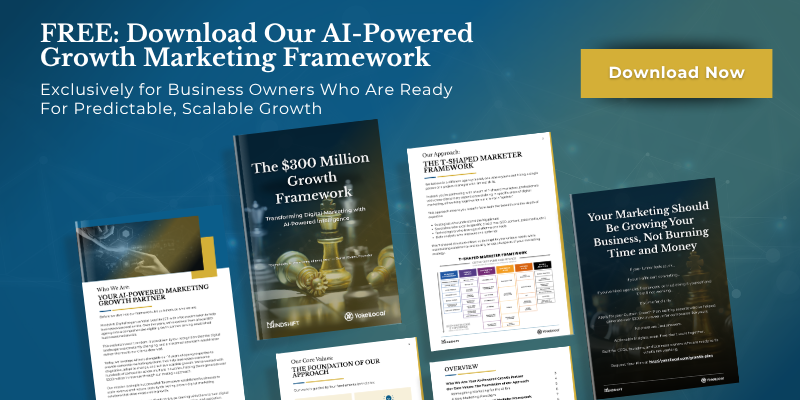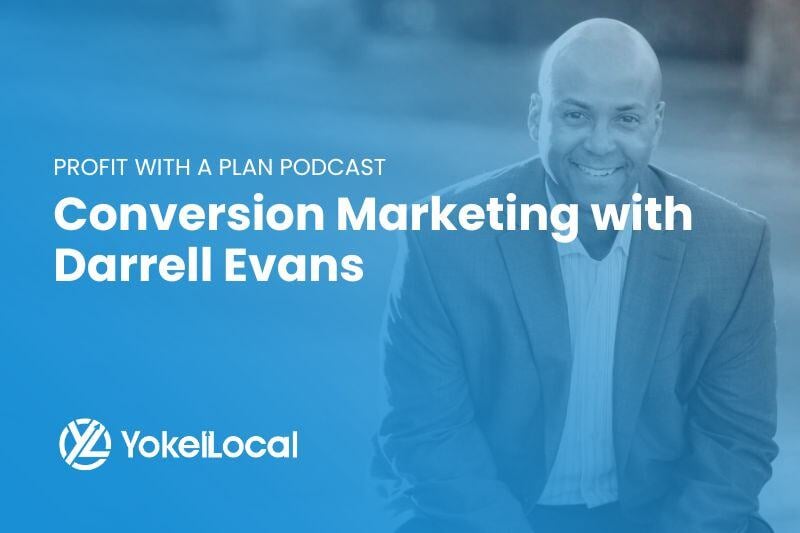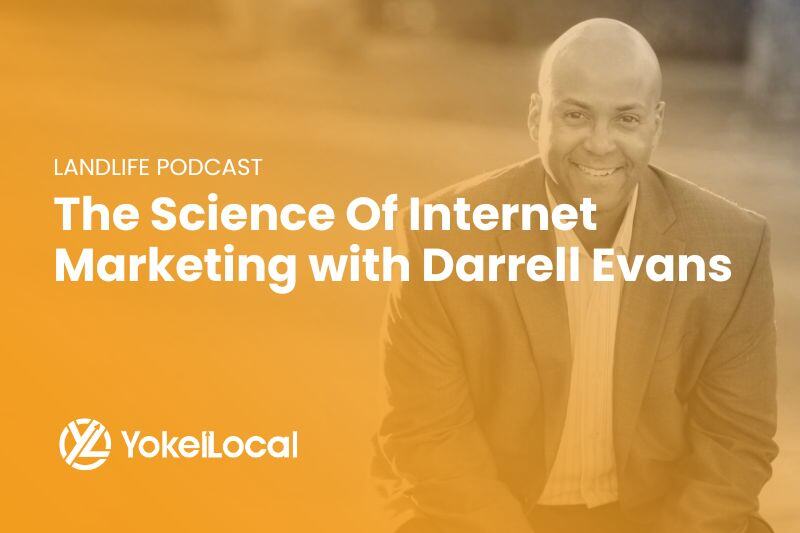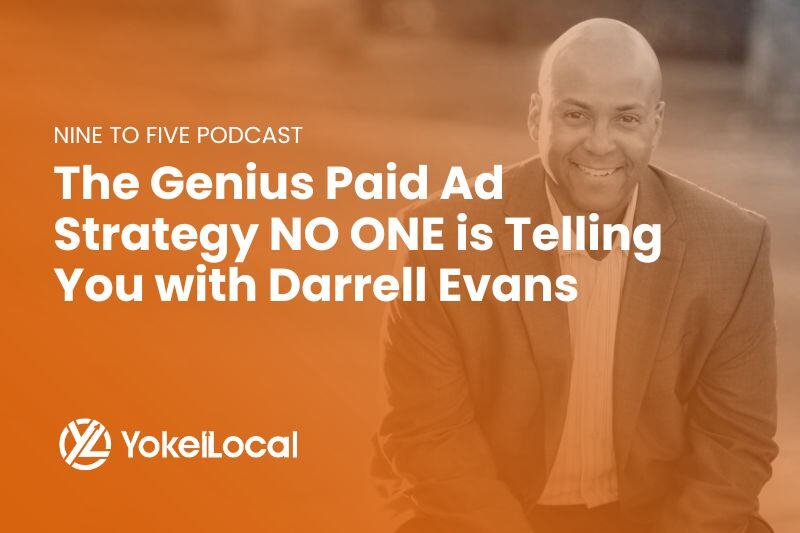Do you sometimes let your mistakes get the better of you? Have you ever found yourself blaming others or circumstances for your failures? A critical part of being a leader and an achiever is knowing how to learn from mistakes and not to dwell on them.
On the Mind The Innovation Podcast, hosted by Sannah Vinding, Yokel Local Co-Founder Darrell Evans discusses how leaders need to make new decisions based on facts and how leaders must focus on the outcome, as opposed to their role in the outcome.
Sannah:
I'm always excited to learn. And in today's podcast, we're going to talk about how to overcome failures and setbacks. I want to welcome Darrell Evans, who's the business growth advisor, investor, and he's also co-founder of Yokel Local Internet Marketing. So welcome, Darrell. I'm excited to have you on today.
Darrell:
Thanks for having me. I'm looking forward to it. It's gonna be fun.
Sannah:
Yeah. So let's jump into it. Let's talk about failures and setbacks. And you actually call it the MindShift method. What is that?
The MindShift Method
"Yeah, so failures are part of life. They're part of achievement. They're part of growth. And I've always looked at failure as a learning opportunity. Even though, in the moment, when we fail, it hurts. You know, it hurts."
Darrell Evans
Darrell:
Either it hurts our ego, it hurts because we are worried about how we're perceived by our peers, by our family by our friends, co-workers, former business bosses, or whatever the case is. I've learned over the years that there's a methodology to moving through setbacks, failures, or, what I like to call, breakdowns in route to breakthroughs. And over the years, I've just had a four-step model that I've used, and I keep referencing it back to everything that's happened in my personal life, business life, and everything in between. And I've called it now the MindShift Method.
And so the first step in the method is to make peace with the facts. And that first step has to do with — it's an internal acknowledgement. So often, we find ourselves blaming circumstances or looking for reasons why something happened, and we can go a little deeper as we go. But the first step is make peace with the facts.
Step two is make a new decision based on those facts. You know, it's not what happens to us that really determines our future, determines our destination. It is a moment in time, that will now become old news. And it's up to us to make a new decision about what we're going to do going forward. And that decision is — the distinction I like to coach people on is that the word the root word decir — deci, excuse me, has the word cut in it, which means we're cutting off any other past options. Meaning, we're gonna make a new decision, we're cutting off options, and we're going to make a decision move forward. And so a lot of times that means like drawing a line in the sand about what we're going to do now, going forward.
So step three, of course, that is the hard part once we've decided what we're going to do or decide what decision we're going to make to move forward from this setback is to come up with a plan of action. And so making a plan is step three and this is where a lot of us — a lot of times, we're still hurt, our emotions are still a little razzled, by whatever it could be that failure moment. And a lot of times we don't recognize how easy it is to reach out to someone who's been in the same situation, who's moved into a new direction that you may be wanting to go into — example, someone's got divorce. Is there someone else who's moved through divorce? Sure. Is there someone who flunked out of college? Yeah, there's someone else who flunked out of college. Is there someone else who lost a business? Sure there is. So you can find someone — a mentor, a coach, or someone who can help you with the plan if you're unable to come up with the plan. And of course, unfortunately, step three is where humility comes in. Right?
"Sometimes we don't like to admit our failures. We don't like to get honest with ourselves and we're worried about what people are gonna say. If we could just lose that ego-consciousness we’ll be fine."
Darrell Evans
But step three is make a plan and you might need some third-party help with that.
And step four is where all the work comes in. Right, make it happen. Step four is make it happen. And that is the daily discipline now of doing the little things, consistently over a long period of time that will bring you to your new future, to your new destiny, to your new vision, or outcome. And that is where things get lost, because a lot of times, we get excited at the moment, because we're really emotional about failure. And if we can't separate our excitement in the moment and realize that the work has just begun, once we decide what the plan is going to be, etc., and unfortunately, that's where I see a lot of entrepreneurs and just, life in general, achievers, even myself, you know, we just fell off the rails in terms of keeping commitments to ourselves. And that is where, you know, we have to really wrestle with ourselves about keeping those commitments to ourselves.
Sannah:
Yeah. But I think where a lot of people's struggles, and I can see that in organizations or in companies, it's also to admit that it is a failure or you can say it’s a learning, because failure is negative. But to admit it, it's so vulnerable, right? To go in there and saying, “Hey, this is not even working, or we need to find a plan.” But to admit that it happened without pointing a finger and saying it was there, it happened in that team. Any recommendations of how to build the trust, so it's not going to be this blaming game?
Disarming The Blame Game
Darrell:
You know, I guess as you state that question, I think of a few things. When I think of, in a corporate environment, for example, back to something earlier, I said. And I left the corporate world decades ago, so I can't speak to the inner workings of corporate culture, although I hear it, I can see it. I've got friends in it. I think the number one thing that I can advise a leader to do, an achiever to do — see, I'm only speaking to people who are leadership-minded and achievement-minded. I'm not speaking to the average person who's just going to work to get a job to do what they're told to do. Do it as little as they possibly can so they can get paid every couple of weeks. That's not who I'm speaking to. I'm not trying to get, you know, I'm talking to the leader. So how does a leader survive failure? How does an achiever deal with the attack?
And that is — and this is a really hard statement for some people to get their hands on, but I have to credit this to Jack Canfield, who taught this to me a decade and a half ago, and that is: it's all your fault. So that feels real heavy, right? When you're on a team of leaders and someone else didn't do their job to your left or to your right, or when you're handed down an assignment or maybe you have a team.
"But here's the simple reality: If we are going to move forward in life, if we're going to move forward in career, in cooperation, and teamwork, leaders take responsibility."
Darrell Evans
And so I just think of it as whatever when I heard that I was sitting in this room when he was saying this and I was just like, ahh. And it still has to be reminded of me, even, in my current business ventures, in my current relationships, in life, and everywhere. It's like, OK, if something's not going our way, can we just take responsibility for our role in the situation? We can't take responsibility for someone else's mistakes, but we got to take our responsibility for: Is there something I could have done as a leader to have ended up with a better outcome? And I know that doesn't sit well.
Listen to the rest of the interview to learn how to view setbacks as positive lessons, plus how to use mistakes to help reach your goals.













